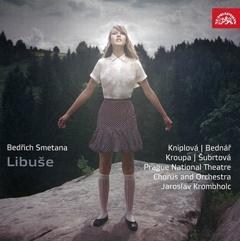Bedrich Smetana – Libuse (2009)
Bedrich Smetana – Libuse (2009)

CD 1 1. Overture 00:08:19 2. Act 1 - Libuse´s Judgement - Scene 1: You, Krok´s illustrious daughter 00:08:50 3. Act 1 - Scene 2: I cannot join them! 00:04:17 4. Act 1 - Change of scene. Scene 2: Alas that between sons such confliets... 00:05:48 5. Act 1 - Scene 3 - The procession: The snake is not here 00:20:34 6. Act 2 - Libuse´s Marriage - Scene 1.: Water the horses now and wait for me! 00:18:05 7. Act 2 - Scene 2: My uncle bid me to my father´s grave 00:10:22 CD 2 1. Act 2 - Change of scene - scene 3: Heya! Heya! Without rest onward 00:11:06 2. Act 2 - Scene 4: The work is finished 00:07:35 3. Act 2 - Scene 5: From Libuse we bring you greetings 00:12:38 4. Act 3 - Scene 1: Peace is made again between the two brothers 00:07:51 5. Act 3 - Scene 2: He comes! He still remains hidden.. 00:02:49 6. Act 3 - Scene 3: Welcome to us 00:02:36 7. Act 3 - Scene 4: Did she not say that all the power now... 00:04:39 8. Act 3 - Scene 5: Hail, stronghold of Vysehrad 00:17:25 9. Act 3 - Libuse´s prophecy (with Six Pictures from Bohemia´s History): O Gods almighty 00:02:15 10. Act 3 - Libuse´s prophecy: Picture I: Bretislav and Jitka 00:01:41 11. Act 3 - Libuse´s prophecy: Picture II.: Jaroslav of Sternberk 00:01:39 12. Act 3 - Libuse´s prophecy: Picture III.: Premysl Otakar II., Eliska and Karel IV. 00:01:40 13. Act 3 - Libuse´s prophecy: Picture IV: Zizka, Prokop the Great and the Hussites 00:02:53 14. Act 3 - Libuse´s prophecy: Picture V.: George of Podebrady 00:01:45 15. Act 3 - Libuse´s prophecy: Picture VI - The royal castle in Prague 00:01:50 Nadezda Kniplova (Libuse) Vaclav Bednar (Premysl) Milada Subrtova (Krasava) Vera Soukupova (Radmila) Zdenek Kroupa (Chrudos) Ivo Zídek (Stahlav) Chorus and Orchestra of the Prague National Theatre Jaroslav Krombholc - conductor
The opera Libuše occupies a unique position in Czech national culture. Smetana composed it as a festive opera to be performed on occasions celebrating the Czech nation. The first such was the opening of the National Theatre in Prague in 1881, when the work was premiered. Supraphon’s catalogue already contains CDs of Smetana’s Libuše in two live complete recordings documenting the interpretational mastery of the artists associated with the National Theatre: the legendary recording of the performance in 1983 marking the reopening of the theatre after its reconstruction and featuring Gabriela Beňačková in the lead role, and the 1995 recording of the new production of Libuše at the National, when the lead role was undertaken by Eva Urbanová. Now Supraphon is supplementing these recordings with a hitherto unreleased on CD older studio recording from 1965, when under Jaroslav Krombholc the lead role was rendered by Naděžda Kniplová. ---supraphon.com
Joseph Wenzig (1807-76) wrote several plays and opera librettos derived from events (sometimes fictional) in Czech history. Libuše was the second of two librettos he wrote for Smetana, the first being Dalibor. In both cases, Wenzig wrote the libretto in German and it was later translated into Czech by Erwin Špindler. Wenzig finished his Libušas Urtheilsspruch und Vermählung (Libuše's Verdict and Wedding) in the spring of 1866, and Špindler did his best to preserve the original syllabic characteristics and stresses of the German, a task he completed in February 1868. Smetana completed all three acts in full score by November 12, 1872.
Wenzig's story is of the legendary Libuše, Princess of Bohemia, whose verdict in a land dispute is refuted by one of the participants, Chrudoš od Otavy, who will not accept the judgement of a woman. This prompts Libuše to take a husband, and she chooses Premsyl ze Stadice. The opera closes with Libuše's prophecies, during which several people from Czech history appear as Libuše comments on them. The monumentality of the piece grows as it progresses, culminating in Libuše's prophesy, "My beloved Czech nation will not perish; gloriously she will vanquish the terrors of hell!"
Smetana wished Libuše to be performed in association with an important national celebration, such as the inauguration of the Czech National Theater in Prague. The composer withheld the score until his wish became a reality, and Libuše won the National Theater competition and was first produced there on June 11, 1881. The theater burned down two months later; when it reopened in 1883, it was again inaugurated with Libuše. To this day, Libuše is staged in the Czech Republic for events of national celebration. Smetana did, however, allow the overture to be played as early as April 1872. He never heard Libuše because by the time it was staged; he was deaf. Smetana regarded Libuše as his finest opera.
Libuše is Smetana's most ambitious and grand opera and its focus on the greatness of the Czech nation makes it unprecedented. Themes are more closely associated with characters than in any of his other works but, as in Dalibor, they are not employed in a Wagnerian fashion. Two brothers, Stahlav and Chrudoš, each has his own theme but also share a theme, representing their brotherhood. Premsyl and Libuše's themes, both diatonic, mingle when the two come together in Act III. Libuše's music has greater emotional sweep than that for Premsyl and forms a significant part of the multi-sectional overture.
Monumentality and grand closes are a salient feature of Libuše, and Smetana achieves both of these through long stretches of static harmony, particularly in the more solemn scenes. An excellent example occurs at the climax in the second scene of the first act, in which Libuše, Radovan, and the chorus sing through an extended passage of tonic harmony, only to be followed by an ever longer passage of dominant pedal with numerous repetitions of the dominant chord producing a powerful cumulative effect. ---John Palmer, Rovi
download: uploaded yandex 4shared mediafire solidfiles mega zalivalka filecloudio anonfiles oboom








